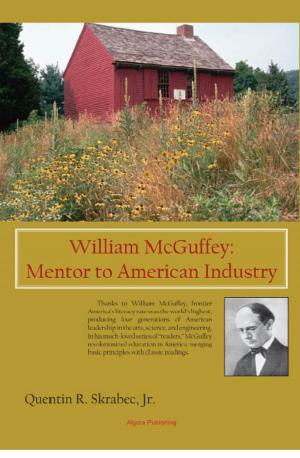Starter Home
Discovering the Past in Central New York
Nonfiction, History, Americas, United States, 19th Century| Author: | Peter Svenson | ISBN: | 9781628940473 |
| Publisher: | Algora Publishing | Publication: | October 15, 2017 |
| Imprint: | Algora Publishing | Language: | English |
| Author: | Peter Svenson |
| ISBN: | 9781628940473 |
| Publisher: | Algora Publishing |
| Publication: | October 15, 2017 |
| Imprint: | Algora Publishing |
| Language: | English |
Svenson documents the dynamic of a village's growth as it coincided with the American experience.
In format, the book is similar to "Battlefield: Farming a Civil War Battleground" (by the same author), which was a 1993 National Book Award Finalist and bestseller.
The book begins with a consideration of the Iroquois who, after the Revolutionary War, were gradually relegated to marginal status. Canal Commissioner DeWitt Clinton made a fact-finding journey across New York State in 1811 (his carriage passed through the crossroads that would later become Fayetteville). His journal, liberally quoted, provides insights about the people and the geography, the hardships of travel, and tidbits of information that captured the wide-ranging attention of a brilliant man of those times. This is followed by a consideration of the Erie Canal itself, the success of which, plus the development of waterwheel power, led to the village's industrial development and subsequent wealth in the latter half of the 19th century.
America's 22nd and 24th president, Stephen Grover Cleveland, also figures in the story. He was the fifth child in a Presbyterian minister's large family that moved to Fayetteville in 1841 and lived there for ten years. Svenson documents President Cleveland's boyhood as well as his later rise to political prominence, a slice of regional and national political history that bears particular relevance today.
The author also discusses Matilda Joslyn Gage, the great 19th century radical feminist and champion of women's suffrage, who lived in Fayetteville for 40 years until she died in 1898. Through excerpts, he describes Gage's seminal book, "Woman, Church and State," which was actually banned in Fayetteville when it was published in 1893.
Present-day highlights of the village, today a bedroom suburb east of Syracuse, are contrasted with those of its past - for example, the opulent 19th-century residential architecture in contrast to the small postwar prefab houses in a subdivision. Svenson shows us hw to cherish every detail.
"Starter Home" is an original, droll, literary, and carefully-researched nonfiction book that will appeal to a general readership, but it will also satisfy serious students of American history.
Svenson documents the dynamic of a village's growth as it coincided with the American experience.
In format, the book is similar to "Battlefield: Farming a Civil War Battleground" (by the same author), which was a 1993 National Book Award Finalist and bestseller.
The book begins with a consideration of the Iroquois who, after the Revolutionary War, were gradually relegated to marginal status. Canal Commissioner DeWitt Clinton made a fact-finding journey across New York State in 1811 (his carriage passed through the crossroads that would later become Fayetteville). His journal, liberally quoted, provides insights about the people and the geography, the hardships of travel, and tidbits of information that captured the wide-ranging attention of a brilliant man of those times. This is followed by a consideration of the Erie Canal itself, the success of which, plus the development of waterwheel power, led to the village's industrial development and subsequent wealth in the latter half of the 19th century.
America's 22nd and 24th president, Stephen Grover Cleveland, also figures in the story. He was the fifth child in a Presbyterian minister's large family that moved to Fayetteville in 1841 and lived there for ten years. Svenson documents President Cleveland's boyhood as well as his later rise to political prominence, a slice of regional and national political history that bears particular relevance today.
The author also discusses Matilda Joslyn Gage, the great 19th century radical feminist and champion of women's suffrage, who lived in Fayetteville for 40 years until she died in 1898. Through excerpts, he describes Gage's seminal book, "Woman, Church and State," which was actually banned in Fayetteville when it was published in 1893.
Present-day highlights of the village, today a bedroom suburb east of Syracuse, are contrasted with those of its past - for example, the opulent 19th-century residential architecture in contrast to the small postwar prefab houses in a subdivision. Svenson shows us hw to cherish every detail.
"Starter Home" is an original, droll, literary, and carefully-researched nonfiction book that will appeal to a general readership, but it will also satisfy serious students of American history.















